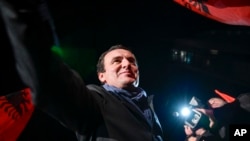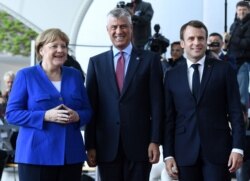Burim Goxhuli contributed to this report.
An early election in Kosovo on Sunday, where a center-left opposition party garnered the most votes, seems poised to change the political scene, and analysts say it may reshape the country's normalization dialogue with neighboring Serbia.
In a statement to Voice of America, a State Department spokesperson called on Kosovo’s new leadership to be prepared “to engage immediately with Serbia and work towards an agreement on normalizing relations.”
The head of the Vetëvendosje (Self-Determination) party, Albin Kurti, acknowledged the importance of dialogue but suggested he is in no rush to start normalization talks.
"It cannot be top priority on day one of me as a new prime minister," Kurti said in an interview with the Associated Press.
If Kurti — ex-leader of a student movement with a nationalistic bent — becomes prime minister, he would be the first post-war leader of the country that does not come from the ranks of former independence fighters.
Kosovo’s Democratic Party, of whom President Hashim Thaçi is a former leader, will for the first time become the opposition.
Vetëvendosje, however, will not be able to form a government alone. With all votes counted, the party has 25.59% of the vote, and Kurti has already invited the center-right Democratic League of Kosovo to form a coalition.
Dialogue with Serbia
The EU and the United States have been pressing Kosovo and Serbia to resume dialogue as a path towards Euro-Atlantic integration. Talks have been stalled, however, since Kosovo imposed a 100% tariff on Serbian goods last November.
While some analysts are leery about predicting whether the tariffs will be lifted immediately, others are guardedly optimistic.
“A new government, with the assistance of the United States and the European Union, can easily come up with a formula with Belgrade where, for example, the tariffs are suspended while our talks begin,” says analyst Janusz Bugajski.
Serbia, however, does not recognize Kosovo’s 2008 declaration of independence, which followed a NATO campaign to stop ethnic cleansing by Serbian forces.
Over the last year, talk of a border change involving a territorial swap held the promise of breathing new life into normalization talks between Kosovo’s Thaçi and his Serbian counterpart, President Alexander Vuçiç.
David Phillips of Columbia University says that idea is now dead.
“The negotiations need to have an agenda, and the agenda should be the fulfillment of existing agreements," said Phillips, director of the university's Program on Peace-building and Rights. "The negotiations should not be about territorial swaps or border partition. The people of Kosovo don't want it. None of the leading parties want it.”
Daniel Serwer of Johns Hopkins University says the people of Kosovo have already spoken, by casting their votes against government corruption and the proposed border change.
“I expect Kosovo to go to the next phase of the talks with a solid position in favor of the territorial integrity and sovereignty of the state," he told VOA's Albanian Service. "I think it will press that point, and that may mean no immediate solution to the status problem.”
Western concerns, hopes
Western officials have been uncomfortable with Kurti's past positions, such as his advocacy for Kosovo's unification with Albania.
Kurti served more than two-and a-half years in a Serbian jail for pro-independence activities, only to be released in 2001 following Western pressure on Belgrade.
Following this weekend's election, Serbian Defense Minister Aleksandar Vulin called Kurti "scum," while Marko Djuric, the Serbian official in charge of Kosovo affairs, called Kurti a liar and "extremist" who was "stomping" on the democratic rights of Kosovo Serbs.
But Edward Joseph of the Center for Transatlantic Relations points out that some politicians change their tune once in office.
“Being in government changes people and changes politicians,” he said. “It’s very easy from the outside to criticize this, it's another thing to come to Brussels or to Washington, or receive senior visitors from Brussels or Washington, and to hear them”.
He says Kosovo is dependent on outside actors for both economic and security reasons.
Phillips of Columbia University says U.S. officials will adjust to the new reality.
“Kurti will have the first shot at forming a new government," Phillips said. "He's going to need to work collaboratively with other parties, and he's going to have to address relations with Kosovo Serbs and the Srpska lists, so that we can work constructively towards strengthening a shared society which is multi-ethnic and democratic.”
Serwer of Johns Hopkins University says those who thought the United States would make every effort to maintain the so-called "stabilocracy" — the idea of tolerating strongman rule in exchange for political stability — have miscalculated.
“Whenever there is a serious governing alternative available in the Balkans, the Americans have not objected to its coming to power, and they shouldn't object to its coming to power,” he said.
Newly appointed U.S. envoy for the Kosovo-Serbia dialogue, Richard Grenell, is visiting both countries this week.
This story originated in VOA's Albanian Service.






